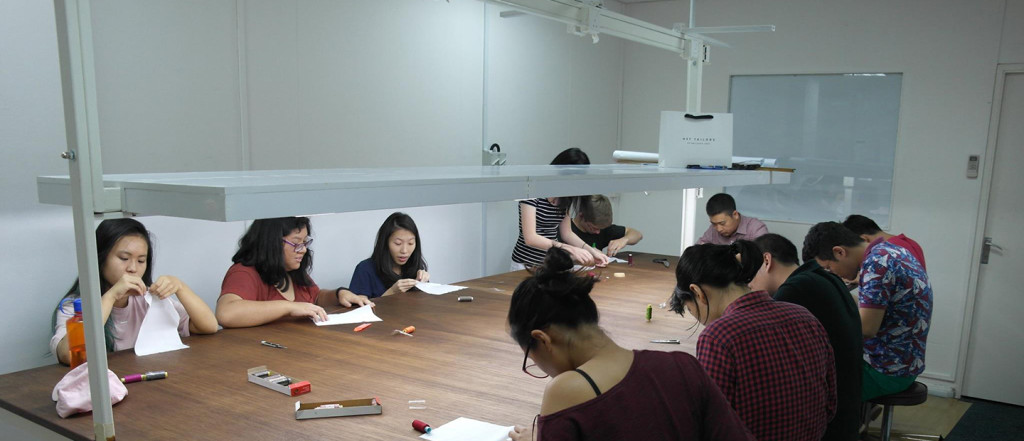Students initiate practice-based learning opportunities
A good part of learning at Yale-NUS College takes place in the classroom. But learning does not stop at the classroom. Being in a young liberal arts college, students have the flexibility and opportunity to initiate their own learning pathways, while receiving support from the College to pursue their interests. In fact, some students are finding success outside of the traditional classroom setting, taking the initiative to acquire new skills and knowledge that cannot be found from textbooks and lectures.
In the words of Elson Ong (Class of 2017), an Urban Studies major, practice-based learning is “learning through activities to acquire practical skills, in contrast to learning in the classroom”.
Last semester, Elson took a course titled “Urban Spatial Reasoning and Visualisations”, in which he learned how to create representations through data mediums such as maps and 3D modeling. The course was jointly conducted by the College and the Future Cities Laboratory, an external think tank. In the course, Elson was trained to use a geographic information system (GIS) and software such as Adobe Illustrator and Photoshop. He also learnt how to make models using 3D printers and laser cutting equipment in the College’s Fabrication Studio.
His final project involved constructing models for spaces in Singapore represented by 1 cm by 1 cm squares on a map, which was then showcased in an exhibition. “The course bridged the gap between learning theoretical knowledge in the classroom and acquiring practical skills,” said Elson.
Having benefitted from the hands-on training provided by the urban visualisation course, Elson, who is co-founder of the Fashion Society at Yale-NUS, decided to initiate a co-curricular course on sewing to bring this experience to his fellow schoolmates.
The course arose from the desire to have a strong foundation for sewing. “It’s a basic life skill that everyone would benefit from,” he said.
Elson began planning the workshops towards the end of the summer break, coordinating with the Arts & Media team of the College’s Educational Resources & Technology (ERT) Department, which supports students and faculty to learn, teach, conduct research, and express themselves creatively.
 Students sew pocket squares in a workshop hosted by Hwa Seng Tailors.
Students sew pocket squares in a workshop hosted by Hwa Seng Tailors.
In the first workshop held on 20 August, workshop participants learnt to sew reversible book covers using a sewing machine. For the subsequent workshop, students took their learning outside of campus and visited Hwa Seng Textiles, a local tailor with over 40 years of experience. They learnt to make pocket squares, with hand rolled hems and cross stitching, as well as practical knowledge like how climate affect the quality of wool and woven cloth.
“How do you sew a uniform seam? How do you hide the seams? What is a mother-of-pearl button and buffalo-horn button? They were introduced to all of those concepts in a three-hour session,” explained Mr Gurjeet Singh, Associate Director of Arts & Media who provided support to Elson in developing the workshops.
Elson hopes to incorporate more skill-based workshops in the future, so that students can be trained to operate a sewing machine comfortably.
Elson said the benefits of practice-based learning are in the “do while you learn” approach, in contrast to the theories in traditional classrooms.
The College’s Arts & Media team supports curricular and co-curricular activities at the College, such as creating a ‘maker space’ for students who want to do tinkering for course projects or individual pursuits, or providing consultations on how to put together a production. Mr Singh’s goal for his team is to develop the ‘individual, group, and cohort voice’ of Yale-NUS students.
For example, several students who had no prior experience but wanted to study film, started out by stitching together video clips they filmed on their smartphone cameras. “As they worked with us, we started introducing them to DSLR cameras, and as they get more exposure to professional equipment, they become more sophisticated in how they approach their projects,” said Mr Singh.
During the initial stages, the students created thematically similar films when starting to use the new equipment and techniques. Now, Mr Singh notes that the films shown at each Film Society screening have become unique as students are starting to develop a distinct style – a transition from the student group’s voice to the individual’s voice.
The Arts & Media development plan consists of four phases: exposure, excursion, experience, and creation.
“What we do is not just the teaching of skills. It is also about extending inquiry beyond what they thought they knew,” said Mr Singh. After the initial exposure and excursion, the Arts & Media team guides students as they take ownership of their learning and experiences, and ultimately creating works of their own.
“Eventually, we want them leading the workshops, and operating the machines confidently,” he said.
Mr Singh believes that there should be less of a focus on goals and obtaining immediate results, and more practice-based engagement. “If the students are motivated, the results will come eventually,” he said.
At Yale-NUS, students have the opportunity to be exposed to different types of techniques and among these include practice-based learning. Practice-based programming at the College ranges from curricular courses such as creative music composition and drawing methods, to co-curricular workshops such as dance demonstrations and writing classes.





